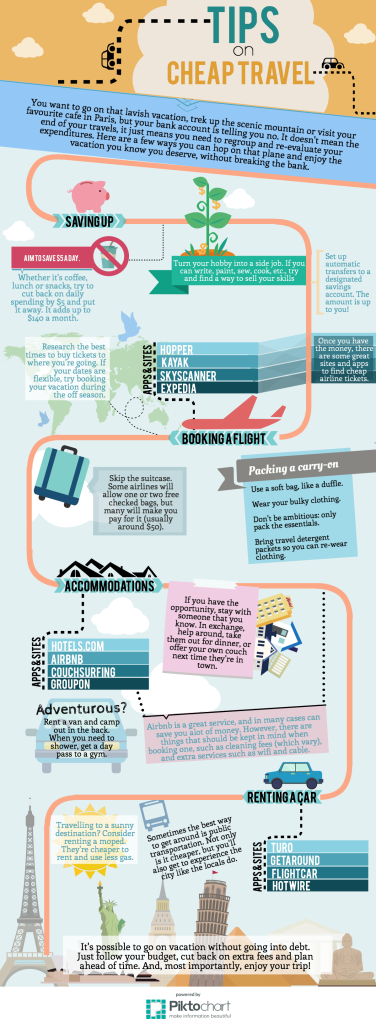Affordable adventures: dream vacation without breaking the bank
STORY BY JASMINE ANTHONY
Relaxing on white beaches, trekking across vast mountain ranges, or seeing the ancient wonders – whatever strain of travel bug you’ve caught, there is one thing in common: the price tag.
Unless you’re content to pitch a tent in the backyard or scoop up a Groupon for a night at a local hotel, there’s a pretty good chance you’ll be spending a substantial chunk of change on your next adventure. You can keep entering online contests to win your dream vacation (and watch as your email is slowly spammed), or you can take a different approach. While a vacation will normally cost you several hundred dollars (at least!), there are ways to cut down the cost if you plan well ahead of time.
Type “cheap travel tips” into Google, and you’ll get about 219,000,000 results in less than half a second. The tips start with the obvious: pack light – and wear your heaviest and bulkiest clothes on the plane. Pay attention to extra fees for bags and carry-ons.
But the best way to save money – in some cases, big money – may well be by outsmarting the airline’s IT department.
A sneaky, controversial way that airlines and travel sites boost profits is by tracking cookies and browsing history. Johnny Jet, a popular travel blogger, demonstrated in an article how using a different browser than the one he was originally searching on, saved him nearly $200.
Sherry Henderson, of the blog Save Spend Splurge, wrote in an email interview that she personally experienced the cookie-tracking phenomenon. “(It’s) absolutely true,” she says. “I have tested it myself booking flights to Paris. Mysteriously, five minutes later or the next day, the flights jumped up in price. My partner checked on his computer at the same time and the price was the same as the day before.”
Similarly, according to a 2012 article by the Wall Street Journal, the travel site Orbitz was found to show higher priced hotels first to those using an Apple product to browse. The same price was offered to everyone, but if someone was looking at the same search from a Windows computer, the cheapest results were shown first.
When booking a flight, the app Hopper says it gathers data from virtually all flight prices and sends notifications when prices for a particular flight are at the predicted lowest cost. When you’re planning a flight, this app will tell you the last time the prices were as low, and how likely it is that they will be raised in the near future.
 Henderson, whose blog has a focus on financials, says that another easy way to save money is to plan your expenses ahead of time. “Come up with a preliminary budget for everything from hotels to travel to food, and try to account for it at the end of the day by spending in cash,” she says.
Henderson, whose blog has a focus on financials, says that another easy way to save money is to plan your expenses ahead of time. “Come up with a preliminary budget for everything from hotels to travel to food, and try to account for it at the end of the day by spending in cash,” she says.
She suggests only using cash after paying for the flight and hotel with a credit card. “We keep on track by being able to physically see the money go down and adjust as needed,” she says, adding that you should also “take your preliminary budget and add an additional 15 per cent contingency plan to cover unexpected costs.”
Henderson also has thoughts on affordable accommodations, which is the next big ticket item on a travel itinerary. “Couch surf,” she suggests. “I’ve heard of this but never did it. You can reach out to a network of friends and family who may know people in various cities around the world and then go and sleep on their couch.”
This is exactly what Olivia D’Alessandro did after she graduated university in the spring of 2015. The 22-year-old spent a month travelling through Croatia, Spain, Australia, and Denmark, and all she paid for was transportation and food.
“I stayed with my friends that were studying abroad. I had four friends that were all in different countries, so I was lucky,” says D’Alessandro. Overall, she says she saved several thousand dollars by couch surfing.
She says another perk with visiting friends is that they knew the area, and what was worth seeing. “It was nice because I didn’t have to worry about getting lost or spending money on tours,” she says, adding that because her friends lived in the countries for a few months already, they were familiar with the less touristy spots (which were the highlights of her trip).
If you don’t have the luxury of friends in far away places, there are other options. The recent growth in popularity of Airbnb has taken the stress off of finding an affordable hotel in a good area. However, cleaning fees or other supplementary costs can also add up, so it is important to note all the extra expenses when reserving a place: A $200 house may quickly turn into $300 when taxes and fees are added.
Another expense that can be overlooked in the preliminary stages of trip planning is transportation. Car rentals can easily cost over a hundred dollars a day. Instead of paying for a car from a big-name rental company, try renting locally. There are a few popular sites that you can try. One is Turo, previously known as Relayrides. The company recently rebranded itself, and in an article on techcrunch.com, the CEO of Turo Andre Haddad said the company has raised about $101 million. These peer-to-peer rental sites are not as popular as car rental companies, but, like Airbnb for accommodations, they are steadily on the rise. Two other companies that offer similar services are Getaround and Flightcar.
The downside: you have to be 25 or over if you hold a foreign license.
But if your trip is to a warm and sunny destination, you can also try renting a moped. Fuel efficient, fun, and convenient – mopeds can cost less than half the price of a rental car. Just be sure to wear a helmet – and inquire about insurance.
If you have no commitments at home, there is always the option of working abroad. There are many opportunities across the globe that will enable you to travel, and even make money while doing so.
Of course, there are pros and cons to working abroad. While you get to experience a new and exciting place, you will have to work and possibly live alone in a foreign country. This kind of travel takes a substantial amount of research and planning and isn’t for everyone, but you’ll get to completely submerse yourself in the culture of the country you’re in.
If you’re looking for more of a long-term adventure, there are several companies that provide unique offerings. World Wide Opportunities on Organic Farms (wwoof.net) sets travelers up with organic farmers in different countries, where people complete four to six hours of work in exchange for a full day’s food and accommodation. Teaching English abroad is also a popular option, and there are dozens of countries in which you can do this for anywhere between a few months and several years.
As you can see, there are a number of ways to have a dream vacation without breaking the bank. Be sure to do your research, plan ahead, and – most importantly – enjoy your trip.




